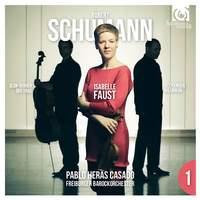Recording of the Week,
Isabelle Faust plays Schumann's Violin Concerto
It's said that the road to Hell is paved with good intentions, and the fate of Schumann's Violin Concerto is a good example of just how unfortunate even a well-intentioned act can turn out to be. One of his very last works, it was entrusted by his widow Clara to the care of the star violinist Joseph Joachim – the legendary virtuoso of Schumann's time, who had encouraged its composition. The story is that Joachim somehow perceived in the work “weaknesses” symptomatic of Schumann's deteriorating psychological health; for many decades the ban that he imposed on it was observed, and the work languished in almost total obscurity.
Even its eventual emergence into the light was only a partial triumph, marred by the taint of anti-Semitism. The planned premiere by Yehudi Menuhin was vetoed by the German authorities of the 1930s in favour of a German soloist who would supposedly launch the work as an Aryan alternative to that of Mendelssohn. All in all, an inauspicious heritage – but as ever, it's best to set that aside and let the music speak for itself. And what music it is! I hadn't heard the work before (perhaps I can count myself a victim of the legacy of Joachim's ban?), but in Isabelle Faust's capable hands it gripped me from the very beginning, with a portentous D minor opening powered forward by a repeated-note dynamo in the strings and underpinned by a stirringly rising bass-line.

One factor that really gives a lift to the sound is the use of gut-stringed instruments and orchestral forces that Schumann would have recognised; Pablo Heras-Casado and the Freiburg Baroque Orchestra made an impression on me with their recording of Mendelssohn's Lobgesang some months ago, and they've worked the same magic here; the music just has that extra little bit of bite where it's needed (especially those driving triplets in the strings that permeate the first movement) and it really makes it leap off the page. If space permitted I could wax lyrical at great length about the haunting moments in the dreamlike slow movement and the stately jollity (if that's not a contradiction) of the finale, which takes the unusual form of a Polonaise. Doubtless other concerti exist that make use of this dance form, but none spring to mind; it's a refreshingly original idea that brings the work to a less frenetic close than might a Rondo vivace, though there's certainly no shortage of opportunities for Isabelle Faust to shine in agile passagework.
Joachim's intentions in attempting to keep this work from performance may have been honourable – protecting his friend's reputation from being stained by a work that he saw as unworthy of being identified with Schumann's name – but I for one am glad that it found its way into the repertoire despite his efforts. It's not a weak work by any means – by turns meditative and stormy, it deserves to be as well-known and as popular as Mendelssohn's.
The other work on this album sees Faust join forces with two other musicians of equally impressive chamber pedigree – cellist Jean-Guihen Queyras and pianist Alexander Melnikov – for an all-star performance of Schumann's third Piano Trio. Again, period instruments make for a unique experience, particularly the sound of the historical piano played by Melnikov, which somehow blends more readily into the trio texture than the extrovert sound of a modern grand. Written for Clara herself to play, it's an intimate and personal work which, again, starts in stirring form with a yearning duet for the violin and cello, accompanied by rippling quavers in the piano. Faust, Queyras and Melnikov have approached this project together – in fact a brief note in the accompanying booklet suggests that the idea of performing the Trio on historical instruments came first, and the Concerto second – and their playing reflects this joint vision. The interplay between them as they draw out the nuances of Schumann's polyphony and answering phrases is as natural as one could wish for.
I couldn't help thinking, as I was listening to these performances, how different things would be had Joachim not imposed his well-intentioned embargo! Isabelle Faust's historically-sensitive performance only serves to underline how wrong the great virtuoso's judgement was. I found myself listening to this disc over and over again – Romanticism at its very finest. I'm definitely looking forward to the other two discs in this triptych, featuring the other two trios and the concertos for cello and piano.
Isabelle Faust (violin), Freiburger Barockorchester, Pablo Heras-Casado (conductor), Jean-Guihen Queyras (cello) & Alexander Melnikov (piano)
Available Formats: MP3, FLAC, Hi-Res FLAC



